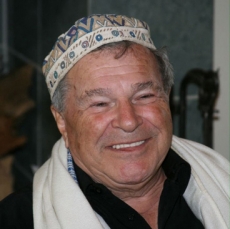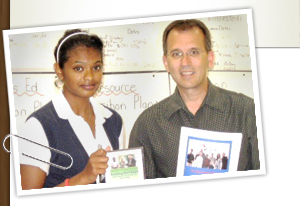Fostering Friendships
Work as a team (classroom teachers, educational assistants, special education and resource teachers and consultants) and with parents. Share information and brainstorm about possible connections and potential friendships between students. A teacher’s life is very busy, but prioritizing good communication will make a lasting difference in the lives of your students. Parent involvement is often a key to continuity of friendships. Consult with working parents to see how best to involve them.

An Educational Assistant on Peer Relationships
I didn’t find the transition from being an Assistant in L’Arche to being an Educational Assistant in a secondary school as easy as I thought it would be. I went from a world of learning and speaking the language of the heart to a world where logic and higher grades of academic achievement were emphasized. After a few years as an EA and a conversation with my father, who works for the same Board, I shared with the head of Special Education at my school and with a teacher who taught the Leadership course the idea of starting a peer mentoring course similar to one that had a profound impact on my own life. Soon the Leadership students were in the Life Skills classrooms where they and the Life Skills students became mentors for each other. Seeing these relationships in the classrooms develop was beautiful, but seeing the relationships carry over in the hallways and the cafeteria (the rooms without the adults/educators setting up the relationships) was extraordinary! Handshakes, high fives, props, conversations, laughter and smiles–students sharing simple moments of joy. I believe as an educator it is my duty to create a learning environment for students that is safe, supportive, and educational but also an environment where students with differing abilities can share their gifts with one another and grow into understanding adults.
EA, ON
Build supportive networks of friends
Identify potential friends among the mainstream students. Encourage peers, especially potential friends, to engage in one-on-one activities with your student who has an intellectual disability as a context for building a relationship. People get to know others when they do things together, and people with disabilities enjoy doing many of the same things as anyone else.
Not every student can become a friend to a student with a disability. Look for students who have a good sense of themselves and some self-confidence, but bear in mind that these are not necessarily the “louder” students. Often a more reserved student can become a lasting friend. If your school offers a peer leadership course, draw on students from this course.
Why are networks so important?
A good, solid network formed during school can foster true friendships and can make all the difference both to a happy experience in school and to lasting social connections after graduation from high school.
Even if these relationships do not last beyond school, they can teach the young person social skills and confidence that will be instrumental to them in forming friendships in their adult life.
Creating an inclusive environment in school will set the stage for a fuller community life for all after graduation.
Sustain these networks
Ensure that someone is chosen to be responsible for regular meetings and check-ins for each network. Monitor these and intervene if the group begins to flounder.
When a friendship has formed help the families to connect with each other so that it can continue outside the school. Where necessary, help parents to grasp the social benefits to their young person of having a friend who is different from them in abilities.
Schools often find network-building plans or tools helpful, but tools are not magic and any effort can pay off. Lead with the opportunities you see at hand as a teacher. A network may include paid support people though most relationships in the network should be gratuitous. The network functions as a small community with the person with a disability at the heart and is help together by their common appreciation of this person. Potential new friends are welcomed by this group and find support, modeling and mentoring there. One tool to help in developing a network of friends is called Circle of Friends. You will find more information about it in this section of this website.
Network Building tools can be enormously helpful, but they require thoughtful application. The same goes for inclusive education. When asked what could be improved in current networking tools, one parent commented “the skills and the values of the people writing and implementing them. It is not about fixing my son, there needs to be a greater awareness of accepting and valuing difference in his classroom.”
SI, BC
Friendships cannot be forced. They need to be encouraged and it needs to start at a young age. Keep in mind that students with intellectual disabilities may prefer to have friends that are similar to them and that’s okay. I don’t hang out with doctors either.
Educator

Encouraging Inclusion
Other students in schools are offered credits and honours for helping in the community– volunteering with seniors and in hospitals etc. Why is this happening when the resource of our kids is right there on site. The students should be getting credits and honours for helping disabled students into the school community. There should be a plan in place to help them do that well and initiatives to encourage them to include a disabled student when a group of them go to the movies or hang out. This would be a good citizenship training program. The schools would be turning out citizens who are compassionate and pro-active who will care about the outsiders in their adult communitie.
Family member, BC

An Educational Philosophy that Values Wonder
The educational philosophy of Rabbi Abraham Joshua Heschel, of which Baruch Rand is a proponent, emphasizes the importance of being attentive to the individual child, recognizing each one’s needs and capabilities. It also puts emphasis on the spiritual dimension of life, nurturing the sense of awe and wonder. Genuine creativity springs from this awe and wonder, Heschel argued. Baruch Rand and like-minded practitioners show an appreciation for what people with disabilities contribute to the lives of others.
Baruch Rand is founder of the Toronto Heschel School and a former head of Jewish Education in Winnipeg.


